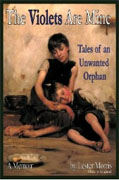The Violets Are Mine
Lester Morris
book reviews:
· general fiction
· chick lit/romance
· sci-fi/fantasy
· graphic novels
· nonfiction
· audio books
· author interviews
· children's books @
curledupkids.com
· DVD reviews @
curledupdvd.com
newsletter
win books
buy online
links
home
for authors
& publishers
for reviewers

 |
The Violets Are Mine: Tales of an Unwanted Orphan - A Memoir Lester Morris Xlibris Paperback 308 pages October 2011 |
|
Lester Morris is a “genuine character,” and doubtless he became so by living through a host of character building experiences, most of them unenviable.
Here is a passage that plainly illustrates the trials he suffered at one foster home where he was expected to refer to his captors as “father” and “mother”: “The door burst open and as he entered the room, he started taking off his big, thick leather belt. I tried to tell him why I was late but he totally ignored me and shouted at the top of his voice, ‘I am fed up with you upsetting your mother. The only way to teach you is to beat some sense into you.’ And he did just that. He ripped my trousers down, threw me over his knee, and thrashed the hell out of my bum, making sure that the big brass buckle got me good.”All that and more, for being late from school after having a talk with his teacher. There is some humor in Morris’s book, but hardly enough to mitigate the almost ceaseless sense of fear and discouragement that the child must have been through. He was tough – he once appropriated a bicycle and rode it hell-for-leather down a steep hill, only to find that it had no brakes. He took the crash landing manfully, but his boldness at perpetrating such boyish capers doubtless made it worse on him in an institutional environment where, at the time, children were treated as inferior beings and those who did not behave were severely punished to keep them in line. A handful of kindly orphanage staff and a few passing strangers, like a Welsh farmer who took him home for Christmas one year, were the only bright spots in his hand-to-mouth existence. In the course of his childhood, Morris learned that he had a brother, Doug, and from that point on he had a partner in mischief and misery as they were shuttled around together. The moves were never explained, since children were powerless underlings in an unfeeling system. “Rights” for children were unheard of. Much later, when he was in his teens and able to get a job, his father contacted him, but it evolved that this was only for the purpose of taking advantage of his employability and virtually stealing his money. During that period, he learned that he had other brothers and even two sisters. Morris escaped from childhood’s woes by the time-honored method of joining the military and went on to have a successful career as a tour guide before moving to the United States. He now resides in Texas and offers his services as, among other things, a very convincing “natural Santa.” It seems a fitting way to wind up his career, since as a child he had few happy Christmases, and now he is able to spread holiday cheer to many. It is also an evidence of his true and admirable role as a “genuine character.” A marvelous example of “lemons into lemonade,” Morris is to be commended for setting aside his bitterness and converting his misfortune into enjoyable talents, including writing, which others can appreciate. Originally published on Curled Up With A Good Book at www.curledup.com. © Barbara Bamberger Scott, 2012 |
|
|
|
 Click here to learn more about this month's sponsor! |
|
| fiction · sf/f · comic books · nonfiction · audio newsletter · free book contest · buy books online review index · links · · authors & publishers reviewers |
|
| site by ELBO Computing Resources, Inc. | |
 Orphaned at an early age (he would only later begin to piece together the reason), Les was dragged through a series of orphanages or foster homes throughout his childhood. During World War II and after, resources in England were strained for ordinary folks and more so for institutions that cared for the poor and dispossessed. Only rarely befriended by any adults in the orphanages and houses he lived in
and with no control over his fate, he was beaten, mocked, tortured and sexually exploited. These words are not used lightly: ice cold baths, beatings with a belt or a bat, starvation and mental abuse were some of the torments the innocent child endured.
Orphaned at an early age (he would only later begin to piece together the reason), Les was dragged through a series of orphanages or foster homes throughout his childhood. During World War II and after, resources in England were strained for ordinary folks and more so for institutions that cared for the poor and dispossessed. Only rarely befriended by any adults in the orphanages and houses he lived in
and with no control over his fate, he was beaten, mocked, tortured and sexually exploited. These words are not used lightly: ice cold baths, beatings with a belt or a bat, starvation and mental abuse were some of the torments the innocent child endured.